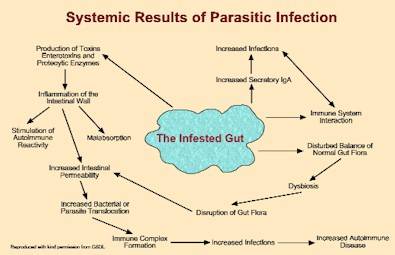Dientamoeba fragilis is a single-cell parasite that infects our lower gastrointestinal tract. It is usually the cause of "Travellers' diarrhoea", chronic abdominal pain, chronic fatigue and failure to thrive in children.
It is known to spread via contaminated water and is connected with poor sanitation, however it is becoming more prevalent in industrialised countries in children. D.fragilis is also closely associated with pinworm, where it is thought that the trophozoite is found in the eggs of the pinworm.
The main symptoms one would experience if infected with this parasite are abdominal pain and diarrhoea (which can can come and go for about two weeks). In children, symptoms can be more severe. Other known symptoms include:
- Weight loss
- Fatigue
- Nausea and vomiting
- Fever
- Urticaria (skin rash)
- Pruritis (itchiness)
- Biliary infection
Because the symptoms of infection resemble those of IBS, many medical doctors will dismiss the notion of infection and some have been known to refuse to perform stool testing. In a 2002 Australian study, a large number of patients who were thought to have IBS actually were infected with D. fragilis.
Inflammation, hives, arthritis, low iron, leaky gut have all been associated in the scientific literature with D.fragilis or B.hominis.
It is known that restricting high carbohydrate foods (ie, grains) from our diet helps, as it this parasite - alongside B. hominis - thrive from the carbohydrate chains found in these foods.
Like B.hominis, the answer is to clear the gut of the parasite, using a similar herbal mix which pierces through the mucosal capsule surrounding the capsule and then flushing it out of the intestines. The gut then needs to be repaired using good quality pre- and pro-biotics. Even the herbal remedies for clearing this can cause problems if not prescribed in correct dosages, so it is best to consult a qualified, registered herbalist with experieince treating these and other types of intestinal parasites.

